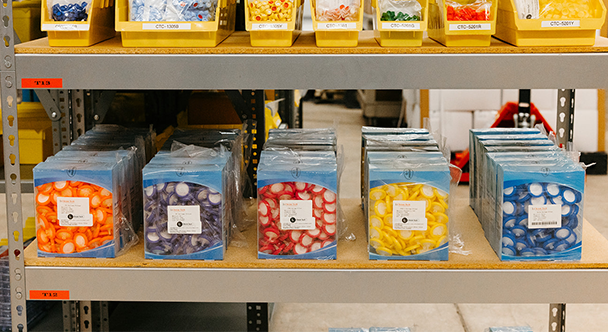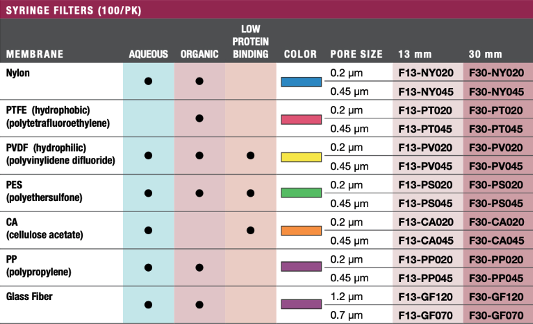28th Jan 2025
Syringe Filters for HPLC Sample Preparation: A Guide to Choosing the Right Filter for Consistent and Accurate Results
Sample preparation plays a key role in high-performance liquid chromatography (HPLC). Though the preparation process can vary depending on the application and the level of sample interference, filtration is a widely used technique. Filters are employed at several stages in an HPLC system, but filtering the sample before injection is especially important to remove particulates that could disrupt separation and analysis. Syringe filters are a cost-effective and convenient option frequently used by chromatographers.

Chrom Tech syringe filters in stock at our warehouse,
ready for shipment at a moment’s notice, and offered at a competitive price
Choosing the Right Syringe Filter
Selecting the Appropriate Syringe Filter for Your Application
To ensure that a sample is filtered effectively and efficiently, you’ll need to determine what filter disc size, pore size, and material will work best for your sample type. If you choose a filter that is incompatible with your sample, it will be extremely difficult to push the sample through the filter and achieve the clean sample you need.
Filter Disc Diameter
Chrom Tech’s in-stock syringe filters come in two disc diameters: 13 mm and 30 mm. The 13 mm discs are used for smaller sample volumes (up to around 10 mL), while the 30 mm discs can hold a larger sample volume (up to around 200 mL).
Filter Pore Size
It is important to choose a pore size small enough to remove unwanted impurities without filtering out the particles you plan to analyze. Also, a dirtier sample will be more difficult to filter as a smaller pore size, so the amount of contamination is also a factor in deciding what pore size you should use.
Filter Membrane Material
Perhaps the most impactful variable in your syringe filter options is the membrane material itself. Each membrane type serves a unique purpose. For example, nylon is often the first choice for a general laboratory filter membrane because of its compatibility with both aqueous and organic solvents. However, nylon does bind to proteins so there are certainly limitations. Here we discuss some of the main advantages and disadvantages of the various syringe filter membranes we keep in stock.
- Nylon is solvent resistant and compatible with both aqueous and organic solvents, but should not be used for protein analysis
- PTFE is very chemically resistant and is hydrophobic so it’s a great choice for organic samples, but can not be used with aqueous samples
- PVDF is also solvent resistant and compatible with both aqueous and organic solvents. Unlike nylon, it is recommended for filtration of biological-type samples as it is low-protein binding
- PES is a mechanically strong membrane typically used for ion chromatography sample prep as another low-protein binding membrane for aqueous and organic solvents
- CA is the lowest-protein binding membrane we offer and is ideal for aqueous-based samples, but not organic solvents
- PP is another hydrophilic membrane that can be used with aqueous and organic samples, and has a wide range of chemical compatibility to organic solvents
Below you’ll find an ordering guide complete with the color pertaining to the color-coded syringe filters for easy recognition in your lab:

Why Use Syringe Filters
Explore Our Comprehensive Range of Syringe Filters
Implementing a filtration step prior to sample injection removes impurities and particulates from the sample, which results in more consistent and reproducible chromatography. Syringe filters are an economical option for filtration and are easy to use. At Chrom Tech, we offer a competitive price on our syringe filters, and carry popular sizes and membranes in stock so you don’t have to wait to start improving your chromatography.

